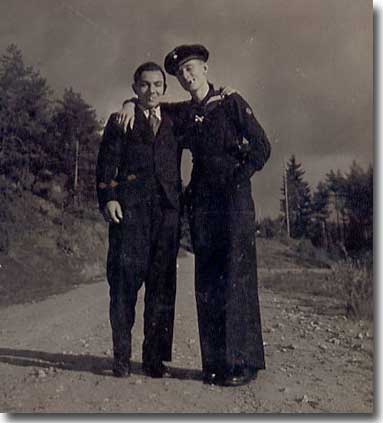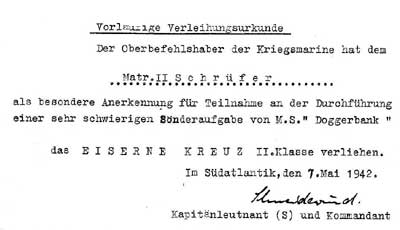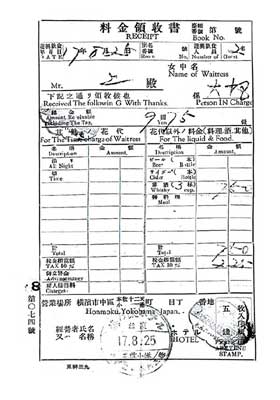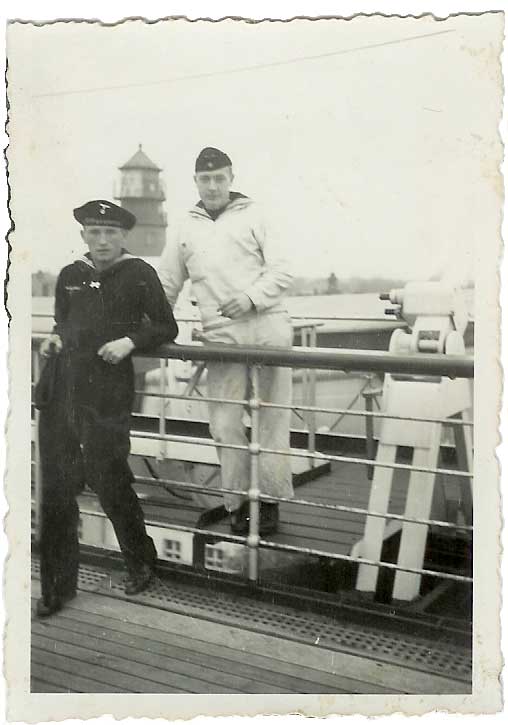|
Interview with Willy Schruefer, sailor in Ramses, captured by HMAS Adelaide
(See "Blockade Runner" and letters.) In 1942 whilst serving as a Sub Lieutenant RAN in the Australian Light Cruiser HMAS Adelaide protecting a convoy in company with the Dutch Cruiser Heemskerck, we came across a Merchant Ship which proved to be the German Blockade Runner Ramses. A combination of our shells and scuttling charges sank this ship. We picked up all her survivors. In 2003, I was contacted by an American freelance journalist working in Germany Ward Carr, who had interviewed in the Spring of 2002, Willy Schruefer, who was a sailor ex the Ramses. This means that back in November 1942, both Willy, now a Prisoner of War, and myself were both in HMAS Adelaide at the same time. Unfortunately Willy died in January 2003. This then is the interview he gave to Ward, which is reproduced here to add a German perspective to my Blockade Runner. I acknowledge the kindness of Betty, who is Willy's widow, and Ward Carr, for approval to place this work on my web site: "Ahoy - Mac's Web Log."
Interview Spring 2002 by Ward Carr
Introduction
Willy Schruefer, on the right with his friend who suggested that they both join the German Navy. He worked in Bayreuth in a company which was in the armaments industry. The group he ran around with got tired of working and wanted to join the service. Because it was a defense-critical company, however, it could keep its employees out of the service. A friend in the company, Georg Sponsell, also from Waischenfeld, [see picture] suggested they join the Navy instead of continuing to work. Willy joined the Kriegsmarine in early 1941 and was in Basic Training in Leer and Terbosch, Holland. He was on the Cruiser Köln for advanced engineering / Machinists/ training. The Köln once put into Gotenhafen where Willy visited his older brother Georg who was a Machinist's Mate on a U Boat. In January, 1942, with several others, Willy was sent from Wilhelmshaven to Bordeaux, France, to board the Doggerbank (formerly Speybank) in the prize crew. The end of January Doggerbank sailed from Bordeaux to the South Atlantic where she tended auxiliary cruisers and mined Cape Town Harbor. In the late summer of 1942, Doggerbank put into Sumatra, then sailed to Japan. In Japan, Willy went to Ramses with a prize crew.
Award Certificate for Willy for an Iron Cross 2nd. Class
1 Japan We received a lot of money so we could afford what we wanted. Of course we bought quite a few things which weren't available to us otherwise, such as spices, pepper and things. Tea and coffee we bought in large amounts, by the bucket. Of course we also went to see some girls. We were there eight weeks or so, so naturally we also had to relieve nature - we almost lost our pants.
Hotel bill We went to Tokyo twice during our stay in Yokohama. A factory owner invited us and we felt obliged to go. He lived in a suburb and there was a sports day on. We were supposed to participate and run against the greyhounds, you know, against the Japanese. We declined as we were too worn out. We received a consolation prize - a pen and a chopstick - as a remembrance of the day. You were in Japan for eight weeks? Did you notice any air raids during that time, American air raids? They were on the islands, that's where the fighting took place. I don't know of any actually within Japan itself. How did the Japanese act towards you? They were mistrusting, suspicious. They were not very outgoing. Did you spend any time in the ship's brig? I had a bit of trouble one time in Japan. I made a deal with the butcher, who also worked in the kitchen. As a butcher he had a blue uniform and I had a white one, being in the engine division. So I said to him:" Look, we'll swap. Mine looks better on you and yours is more practical for me". As the inspection came around and they asked me where my second white uniform was and I replied: "Oh, I've got that somewhere…." they said: "That man has to be punished, lock him up". I couldn't go on watch and I wasn't allowed to go on shore leave. Later I was let out, but in the evening around 5 p.m. when things started to stir, I wasn't allowed to leave the ship.
Well with the Ramses we also had a bit of shooting practice. We were trained on the 2 centimeter guns. We set off for Kobe. As there was no rubber we moved on to Batavia. Borneo was east of there. That's where Bali lies. We intended to load some rubber there but we couldn't get in as we were too deep. We already had freight on board which was why we were pretty low down in the water. We stirred up the dirt a bit and we had to head back out. The water was pretty yellow. From there we went back to Batavia and loaded a huge freight. We were allowed on shore but we didn't receive a large welcoming. We only went to the botanical gardens, to the zoo and for a coffee. What we were able to obtain again though were biscuits, chocolates and such. 2 Adelaide We saw them but they didn't see us, or so we thought, but they followed us. Afterwards on board their ship we chatted amongst us sailors and asked them this and that and how they knew that we were there. They answered:" We have radar". At that time we didn't know what radar was. They'd followed us and provoked us and had even fired a shot across the bow. As that didn't stop us they fired two more shots in one salvo. Around the bridge though was a cement wall, for safety reasons, and they didn't manage to fire through that. Yes and into the shrouds, that is what we called the lateral bracing of the mast. That's when the captain said: "We'll abandon ship!" The captain, the first officer and the demolition (scuttling) detachment stayed, for the mean time, on board. It was all prepared. The explosive canisters were in the engine room. Portside there were also canisters. Everywhere else was fully loaded, full of rubber up to the rim. The only empty space was in the machine room and the propeller shaft tunnel. If the water gets in there then you're done for. All of us, without exception, got into the boats. The charge went off and the "Old Man" and the others got into the boats. And the ship? - nothing happened yet - and then the news - the rapport of the explosion - hit us - hatches closed, cover plates, heavy bolts - they flew up, hundreds of metres through the air from the explosion. The four of them could've gotten off slowly as the ship didn't blow up too quickly. Well and then it just sort of sunk down slowly, with its arse first. The machines weren't there. We had a pig-pen on deck with ten pigs. Every week we slaughtered one. The explosion blew the whole pig-pen up into the air and it landed in the water. The pigs were swimming around and one pig swam over to the cruiser where it was picked up in a net and taken on board. They then slaughtered it. We were treated really well on the Adelaide. The Australian NCOs had to move out of their quarters and we moved in. Boy did we have a breakfast - coffee, black tea, fried eggs, sausages, bacon. "Why did you sink your ship?" they asked us. "We would have received a bonus, each of us so-and-so much, a hundred or thousand English schillings or pounds." "Well, we had to do that, we had to sink the ship, those were our orders," we replied. Anyway, under the strict custody of ten guards, we arrived at the penitentiary in Perth.
The Australian one was the Adelaide, the Dutch one was the cruiser Heemskerck. [ http://www.navy.gov.au/spc/history/ships/adelaide1.htm ] First of all we set off towards India with these two cruisers. They were part of a convoy and had to protect it. In the middle of the Indian Ocean some other ships arrived and relieved these two. After that we headed back towards Australia. The Indian picked up the convoy there. We were strongly guarded in the prison there. Ten men were transported there in a caged truck, two men with guns accompanying us. It was an old prison. Three men to a cell. I can't remember how long we were there - a few days at least. The food was a little rough but we had enough to eat. There was meat in it - mutton - we hadn't eaten it before. 3 Australia The ship landed in Australia. It was a troop transport, English, seaworthy - loaded with soldiers, German G.I's, prisoners-of-war from North Africa on their way to the U.S. We sailed around Melbourne and made our way to Sydney where they put us, the Ramses crew, into quarantine. Magnificent the harbour there, well looked after. After the quarantine was over we were taken to a suburb of Sydney, Liverpool. We spent Christmas there with Jewish guards watching us. You can imagine, we weren't high up in their favour and they pushed us around a bit, but we didn't ask why. As we drove through Sydney on a bus, the people made the gesture of slitting their throat. "Why are they doing that?" we asked ourselves. We couldn't understand it. Later on, after arriving at our new camp in Murchison Victoria, we found out that the "Kormoran", a German auxiliary cruiser, had sunk the Australian cruiser "Sydney" which lost all hands. The Australians thought that we were from the Kormoran which is why they made that gesture. Well you know, the "Sydney" was sunk by the auxiliary cruiser, "Kormoran". [http://www.navy.gov.au/spc/history/archives/kormoran/kormoran.htm and http://members.iinet.net.au/~gduncan/HMASSydney-1.html]
The crew of the Kormoran were great. They had really achieved a lot. They were in their lifeboats at sea for 3 - 7 days after their ship had sunk. They went through a lot. What did you do at the main camp? We had to chop wood, even on Saturdays, there were no free Saturdays. Also the public holidays of Easter, Pentecost and Christmas. Of the two-day holidays we only had one off. But food and board was adequate and the rations were just as big on the last day as on the first. And of course, always mutton, mutton, mutton….we had enough to eat. Well, and then we moved again to another camp, to Croyden, near Kempsey. It was a few miles away, a small camp which the gold diggers had used and dug up around there like moles. There was also a school for the farms near by and even a cemetery. We were put up in tents and we were also allowed to live in the house. There were a few who could speak English so of course they ran away. There was one fellow who took off and lived for half a year in Melbourne. As he was going to the cinema one night with his girlfriend, one of the guards (and they knew who could speak English) recognized him and said: "Come on Phipps". So he was back again. He was also in Sydney at one time, even longer that time, and worked as an automobile mechanic. His name was Bernhard Phipps and was from Bamberg. He worked for the harbour police there after the war. I bumped into him by chance one day in Waischenfeld. Unfortunately he died a few years ago. There were others who also took off and didn't come back. But after the war was over and they heard we were going home, they came back to camp. They of course wanted to go home too but the Australians didn't let them back in that easily. They had to show proof of identification and had to phone around and get this that and the other. Did people often escape from the camp? Yeah sure, there were always quite a few out and about. We were the ones who suffered when someone took off. We didn't get any leave; we weren't allowed to go out. We only went out to catch rabbits. Really we should have been relaxing after working hard all week. Those in the kitchen then had the job of cooking the rabbits. "How would you like it?" they would ask us, "soaked in vinegar or baked?" You could still eat them on Monday evening, so needless to say we didn't touch the other food, but ate our rabbits. Instead of mutton. Can you still stand the smell of mutton? Didn't touch it for a long time after the war, but then I went out once and bought a whole side of mutton. The prison./."Cafe Berlin"- solitary confinement If we did something wrong, we were put into this concrete bunker. It was outside the main camp and was fenced in. If you ran away and were caught then you got put in there for a few days. Those who did suffered quite a bit and were strictly guarded. The usual was three days, in the worst case twelve days. And you? Did you spend any time in solitary in camp? No, I behaved myself. Did you distil your own spirits during captivity? Banana brandy? No, usually raisins, that was the best. We put them or dried apricots and dried plums into tubs and they started to ferment, all on their own without having to add anything. Well, and then we celebrated all the festivities, like birthdays and things, or just for all. The kitchen was busy distilling then. We always celebrated the day we were all taken into captivity - the 28th of November. We had a real binge, and you could drink as much as you wanted. We had everything we wanted - schnapps with added essences to make it taste better and good food, nicely served sandwiches. We only had white bread though, but nicely made. We didn't get any beer, and if we did, then from civilians, from the lumberjacks who did the wood-felling for the jam factory. They had beer and we had schnapps and so we gave them some and they gave us beer in exchange. Only if someone could speak English though could he have managed this. The coachmen, mostly reservists who carted the wood, drank quite a lot too and quite often ended up falling off their seats. And tobacco? You could buy tobacco, cigarettes, as much as you wanted if you had the money. Did they take photos of you and send them back home when you arrived? I don't remember, but we all got uniforms. We had to go to the tailor, who took measurements which were sent back to Germany and then we all got a blue uniform, the Class "A." That was just publicity, propaganda. Sundays we had to walk around the camp, where we also had a lovely chapel too, and the Aussies loved that, watching us march to roll-call in our uniforms. The other Germans who were in captivity didn't get uniforms, just us in Australia. [Note: German PoWs in other countries got uniforms too. In the book Behind Canadian Barbed Wire by David J. Carter, 1998, all photos of POW show them in class A's. When did your mother find out that you were still alive? I can't remember exactly when; but she did find out that I was missing. My brother George said to her: "Things are looking pretty gloomy - missing in the navy - not much chance there. " At that time though I was already in captivity. It was a false report which they later corrected.
Willy's brother Georg (left) who was lost in a U-Boat in October 1943 is in the dark uniform. Aftermath Willy Schruefer died on 27 January, 2003. |




